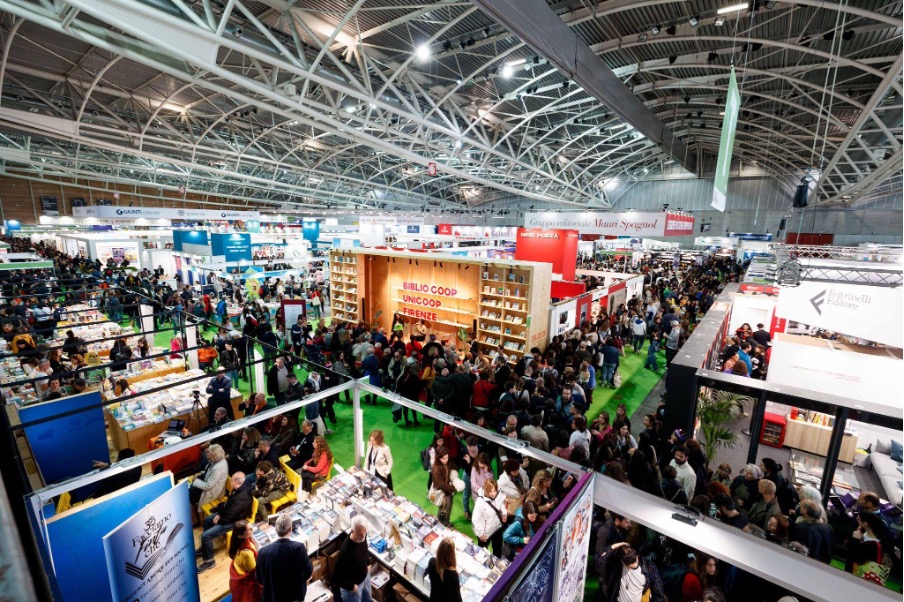The Salone Internazionale del Libro di Torino, or the Turin International Book Fair, was established in 1988 to connect every single participant in the wide-ranging world of literature—from publishers to librarians and, of course, readers. Throughout a large catalogue of readings, performances, conferences, and workshops, the Salone brings in guests from all over the country and abroad to share in the joy of the written world, discuss the current prospects and themes of the industry, and showcase both Italian-language literature and promoting international writing within Italy. This year, Catherine Xin Xin Yu attended the fair on behalf of Asymptote to find out what it has on offer, from migrant literature to eco-writing.
From May 18 to 22, the 35th Salone Internazionale del Libro—the largest annual book fair in Italy—attracted over 200,000 visitors to the Lingotto Fiere exhibition centre in Turin. Over five days of panels, lectures, publisher exhibitions, and literary initatives, perhaps the biggest news story to emerge from the event is an ecofeminist protest led by Non una di meno (Not One Woman Less) and four other Turin-based activist groups against Eugenia Maria Roccella, the anti-abortionist and queerphobic Minister for Family, Natality and Equal Opportunities. Protestors, along with members of the audience who spontaneously joined them, prevented the politician from presenting her newly released memoir in order to demonstrate what it is like to be silenced by the state institutions she represented—which tampers with women’s rights to abortion and surrogate maternity while muddying the water with media misrepresentation and cracking down on protests using police forces. While this peaceful protest was labelled as “anti-democratic” and “unacceptable” by the Meloni government, the Director of the Salone, Nicola Lagioia, defended the contestation as a legitimate democratic act. This is one way in which the Salone provided an urgently needed platform for repressed voices, while opening up a pathway to diversity.
Indeed, the theme for this year’s Salone was “Through the Looking Glass,” featuring over 1,500 kaleidoscopic encounters between storytelling and reality, with notable attempts to bring forward new, alternative perspectives. One such novelty was the focus on colonial legacies and decoloniality. A panel featuring the Somali-Italian author Igiaba Scego, Turin-based Albanian visual artist Driant Zeneli, and Italian crime fiction author Carlo Lucarelli looked at the removal of Italian colonial history from collective memory—drawing attention to the lack of guilt and the myth of “Italiani brava gente” (“Italians, good people”). Many place names in Italy still bear witness its colonial past: visitors in Turin might notice that the final stop of Metro Line 1 is called Bengasi (like the city in Libya); I myself have rented a flat on Via Tripoli and regularly run errands on Via Addis Abeba (like the capital of Ethiopia) and Via Macallè. But these quotidian reminders often go unnoticed, and colonial history is not systematically taught in schools.

At the heart of the discussions on how this silence can be broken are words that “tear apart, resist, and restore,” to quote Jhumpa Lahiri’s preface to Scego’s latest novel, Cassandra a Mogadiscio (Cassandra in Mogadishu). Another panel on decolonisation, featuring the Italo-Somali author Ubah Cristina Ali Farah, the Iraqi author and intellectual Sinan Antoon, and the Filipino trauma journalist Patricia Evangelista, insisted on the importance of reconstructing the lived experiences of victims from a non-Western point of view, and restoring names and humanity to these individuals. Italian, the language of formal education in ex-colonies like Somalia and Ethiopia, is both a line of coloured division and the language of cultural exchange. Recognising the plurality of Italian and using it to foreground individual experiences are both ways to decolonise while writing in the language of the colonisers. READ MORE…

